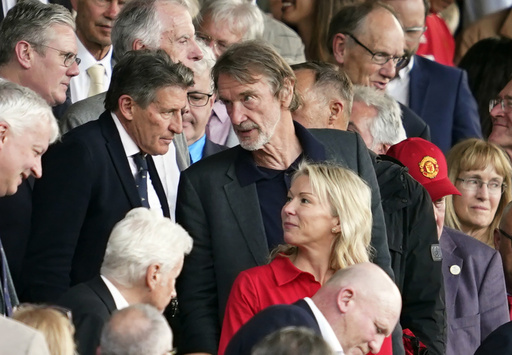MANCHESTER, England — A year has passed since one of the wealthiest individuals in Britain made a significant investment in the country’s most renowned soccer club, vowing to restore its glory. However, the journey for both Manchester United and Jim Ratcliffe has been far from ideal.
Currently, the historically successful club is struggling, positioned in the lower segment of the Premier League standings. Financial losses continue to pile up, stirring discontent among fans. Head coach Ruben Amorim even remarked that this could potentially be the weakest team in the franchise’s illustrious history. Ratcliffe, the billionaire founder of INEOS, acquired a 25% stake in Manchester United for $1.3 billion, along with the responsibility for the team’s operations, but the results have not met expectations since his takeover.
Under Ratcliffe’s stewardship, significant changes, including high-profile hiring and firing, have taken place, accompanied by severe cost-cutting measures. Ticket prices saw an increase, and on-field performance has reached new lows for a team that had already been descending for over a decade prior to his involvement. Despite achieving some success in the FA Cup last season, the victory has been overshadowed by protests from supporters, job losses, questionable transfer strategies, and disheartening defeats.
Ratcliffe expressed that his investment was merely the commencement of a journey to return Manchester United to the pinnacle of football in England and beyond. Nevertheless, those ambitions now seem further out of reach than they have been in many years, with the club sitting in 15th place, perilously close to the relegation zone after a disappointing campaign. The team’s recent 1-0 defeat to Tottenham marked its 12th loss in the league this season, with Amorim experiencing eight of those since taking over in November. Amorim acknowledged the difficulties, asserting, “I have a lot of problems, my job is so hard, but I am here to continue my job to the next week with my beliefs.”
Amorim was one of several key appointments as part of Ratcliffe’s strategy to revamp United’s football operations. Notable hires included Omar Berrada as CEO, who transitioned from Manchester City, and Dan Ashworth, who previously worked with Newcastle, taking on the role of sporting director. Jason Wilcox also joined as technical director after serving in a similar capacity at City’s academy. Ratcliffe brought in influential figures from INEOS Sport, alongside Amorim, as a reaction to the departure of former manager Erik ten Hag, who was let go after just a few months into a renewed contract.
This restructuring has not been without its challenges. Ten Hag was dismissed only three months into a new contract, following a rocky start that saw United lose four of its first nine league matches. Ashworth’s exit from the club occurred less than six months after his appointment, after considerable negotiation to secure his move from Newcastle, resulting in costly errors. The total expenditure for terminating Ten Hag’s contract, alongside his team’s, ran to 10.4 million pounds ($13.09 million), while Amorim’s release from Sporting Lisbon cost an additional 11 million pounds ($13.85 million). Ashworth’s hiring incurred further costs, amounting to between 2 to 3 million pounds ($2.5 million to $3.78 million) amidst a lengthy gardening leave.
These monetary figures are troubling, especially as United has instituted cost-saving measures that included around 250 job cuts — with potential for more. Notably, even the legendary manager Alex Ferguson will depart from his ambassadorial role at the end of the season due to these financial adjustments. Furthermore, the club raised its lowest ticket prices to 66 pounds ($81) from 40 pounds ($49) as a part of its financial strategy, justifying the hike by stating that the club was facing severe financial strain that could lead to breaches of league regulations. The financial losses reported last year stood at 113.2 million pounds ($140 million).
The rationale provided for these decisions has not found favor with the supporters. There has been considerable backlash, with groups like the Manchester United Supporters Trust expressing that “fans should not be paying the price for previous bad ownership & bad management.” The animosity towards the club’s owners, particularly the Glazer family, persists, despite Ratcliffe’s investment. Fans have expressed their discontent, and the team’s lackluster performances have only intensified these feelings.
Under Ratcliffe’s ownership, Manchester United is enduring its worst league season in 34 years, finishing eighth last season. The prospects for the current season appear bleaker, as the team struggles with defeats reminiscent of the 1973-74 season when they were relegated.
In two transfer windows under Ratcliffe, the club has invested about $260 million in player acquisitions, but the squad remains underwhelming in quality necessary for championship contention. New signings like forward Joshua Zirkzee have faced difficulties adapting, while defender Leny Yoro’s season was marred by injury. Compliance with league financial rules adds uncertainty to the club’s capacity to make significant investments to create a squad that aligns with Amorim’s tactical preferences.
Ratcliffe is also focused on enhancing the club’s stadium. He aims to either redevelop the historic Old Trafford or construct a new facility entirely, with ambitious plans for the surrounding area receiving government support. However, securing financing for these projects raises questions, leaving uncertainty about where the capital will originate. The modernization of the Carrington training ground has commenced with a considerable investment of 50 million pounds ($63 million).
The club has not lifted the league title since Ferguson’s last season in 2013, with aspirations to win it for a record-extending 21st time. Nevertheless, Liverpool is on track to potentially equal Manchester United’s 20 titles this season, threatening to set a new record before United can reclaim its position. While Ratcliffe is a highly successful businessman, he is learning that expertise in the business sector does not equate to instant success in the realm of soccer.
